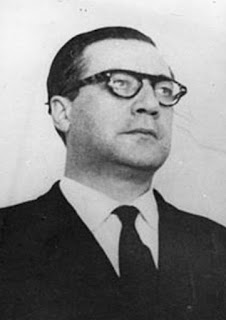Foto: Eugenio González.
 El presente artículo propone un estudio de la narrativa de Eugenio González en el marco de la dictadura de Carlos Ibáñez del Campo (1927-1931). Las novelas de este autor -Más afuera (1930), Hombres (1935), Destinos (1940) y Noche (1942)- bosquejan los procedimientos que dispuso el poder para anular la desobediencia y el desacato. Además, se pormenorizan las labores disciplinarias que ejerció el cuerpo de Carabineros durante este periodo. La novelística de Eugenio González también describe las estrategias de resistencia que emplearon los opositores a este régimen dictatorial. En este sentido, el autor contribuye a la creación de un espacio en la Historia de la literatura chilena que resguarda aquellos testimonios que portan signos de horror, pero también de humanidad.
El presente artículo propone un estudio de la narrativa de Eugenio González en el marco de la dictadura de Carlos Ibáñez del Campo (1927-1931). Las novelas de este autor -Más afuera (1930), Hombres (1935), Destinos (1940) y Noche (1942)- bosquejan los procedimientos que dispuso el poder para anular la desobediencia y el desacato. Además, se pormenorizan las labores disciplinarias que ejerció el cuerpo de Carabineros durante este periodo. La novelística de Eugenio González también describe las estrategias de resistencia que emplearon los opositores a este régimen dictatorial. En este sentido, el autor contribuye a la creación de un espacio en la Historia de la literatura chilena que resguarda aquellos testimonios que portan signos de horror, pero también de humanidad.
“We are fighters, not martyrs”. An analysis of Eugenio González’s narrative in the context of Carlos Ibáñez del Campo’s dictatorship
Abstract
This article suggests a study of Eugenio Gonzalez’s narrative in the context of Carlos Ibáñez del Campo’s dictatorship (1927-1931). This author’s novels –Más afuera (1930), Hombres (1935), Destinos (1940) and Noche (1942) - outline the procedures that the power arranged in order to void the disobedience and contempt. Moreover, there is a description of the disciplinary work which was exerted by Carabineros during this period. Eugenio González’s novels also describe the resistance strategies which were used by the opponents of this dictatorship. In this sense, the author contributes to the creation of a new space in the History of Chilean Literature which protects those testimonies that carry signs of horror, but also signs of humanity.


